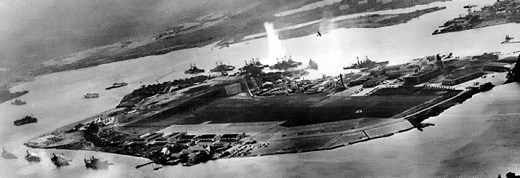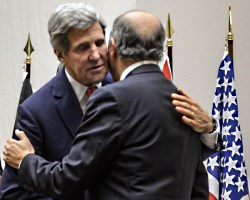The Present’s Past and the Future
From the desk of George Handlery on Sat, 2013-12-07 23:04
Pearl and its perspectives.

Duly Noted addresses a topic for which a grandchild is responsible. The young man prepares a presentation about the USA’s entry into WW2. During our talk, “Pearl” emerged as an instrument to correct some perspectives of the present and its future.
What should another continent know about America? How is one to tell the story so that it is intellectually grasped and emotionally comprehended? We are mistaken to think that, given the USA’s media presence, one can build on that information. On both sides of the Atlantic puddle, it is obvious that, while the quantity of data is extensive, the quality of its understanding is inferior. The problem is compounded because many accepted facts are half-truths, inventions, or simply misinterpretations.
America might be transcontinental country with a growing focus on the Pacific. Still, tradition and necessity involves her in European affairs. This need arises because Europe can be notoriously inept in managing her business. Thereby, informed thinking about the US in her global role becomes a must that Europe likes to ignore. Even for Americans, it is of use to approach their function from diverse perspectives. Today, exactly 72 years after the attack, thinking of the event’s meaning is more than an abstract exercise about the unalterable. Several of the distortions tied to America’s entry into the world are apt to be repeated by friend and foe.
1. The customary road to primacy and America’s path to it differ greatly. Usually, a “Top Nation” ranking is the fruit of dogged striving. Indeed, through her entry in the world wars the US became a great power. Up to this point, the case is conventional. Well, at least until we examine the details. America entered these wars unwillingly and she continues to be a reluctant superpower. In WW1, she reacted to a provocation. In 1941, she was attacked “infamously”. In both cases, intervention has been knowingly triggered by foreign powers and so it does not express America's striving for dominance.
2. The US did not act but only reacted to an ongoing global conflict. America’s preferred international position was that of the neutral spectator that roots for democracy. True, a fraction of her elites, headed by Wilson and Roosevelt were –whether rightly or wrongly is immaterial- “interventionists” and not “America Firsters”.
Involvement in these wars has not been “inevitable”. The chance to act was not handed to the interventionists by a converted public but by a war-waging foreign power. This transcends “history” as the average American would still prefer isolation and neutrality if these would be makeable. Therefore, the rhetoric about the “hegemon” ignores crucial facts. What Europe should fear is not a US “Brezhnev Doctrine”, but unilateralism, isolationism, and its abandonment by Washington.
A further consequence for the present comes from the lacking attraction of “foreign involvement” to augment self-esteem by reassuring Americans that they count in the world. Yes, while “making the world safe for democracy” has a local appeal, Americans easily tire of foreign engagements if they conclude that the locals do too little in their own behalf. This is why isolationism after the “Great War” is explained by the disappointment caused by the peace that France gave the world.
3. Japan’s attack on Pearl Harbor found American forces unprepared in a manner that is embarrassing to a major naval power. Indubitably, Japan’s strike has been a tacticalmasterpiece. Indeed, the raid was a major military success and a political disaster because it mobilized a passive giant. However, without the provocative carelessness of the victim, the blow’s impact would have shrunk. Even so, America’s quick recovery –half a year later, after a standoff in the Corral Sea, at Midway, Tokyo had essentially lost the war- has a long-term negative consequence. The result is a confidence that the US can afford the risks of slack and slumber because its eventual rally will avoid strategic disaster. This sentiment amounts to a handicap that might result in future calamities.
The US’ ambivalence had a causative effect upon Japan’s decision to unleash war. With 6% of the world’s population responsible for 50% of its industrial output in 1945, attacking her appears to have been foolish. This, however, is retroactive wisdom. Even so, we may ask what would have happened if it had it been made clear before the war that, blood being “thicker than water”, the US will support an anti-Axis alliance.
Rightly by the standards of the national interest, America’s attempts reaching back into the 19th century to preserve China’s territorial integrity programmed her confrontation with Japan. Through the victory over Russia in 1905 and then, with the weakening of Europe through the Great War, Japan saw herself as predestined to control the Pacific. This made America’s opposition appear to be a hostile act. Meanwhile, the tough talk and the weak reactions to Japanese encroachments, made it appear that the US lacks muscle and especially the will to back up her proclaimed principles. The US’ performance combined irritations of Japan with inappropriately moderate reactions to her provocations. Nothing incites aggression more than does apparent weakness. The important identification of contemporary analogies is left to the reader.
4. Those that can see the temptations and the choices of Japan in 1941 through the eyes of her rulers, will find a rationale in the decision to tackle America. The way these saw their world, it seemed reasonable to expect that after the loss of the Seventh Fleet, the US would loudly protest and silently accept the facts created by the raid. Then as now, America, even if superficially globally omnipresent, is misunderstood and is generally under estimated. The consequence makes the States into a country about which, quite wrongly, everybody presumes to know everything worth knowing. Poisonous miscalculations are baked out of this dough.
5. It is a mistake to dissect the conditions under which America was dragged into WW2 without mentioning the conclusion of the war in the Pacific. There is a link between Hawaii and Hiroshima. The ignorant, the leftists and the pacifists treat Hiroshima and Nagasaki as an episode without antecedents and they blend out the context of 1945. On that basis, the measure appears to lack a logical or a moral justification. Insert Pear Harbor into the picture, add the projected costs of war on Japan’s mainland, and the decision will make sense. However, the picture only becomes three-dimensional if “Pearl” and the reaction to it is not only known but is also emotionally felt.
6. The red line that goes through this essay is the theme of the reluctant great power. The nuclear post-war era concludes the tale that revolves around Pearl Harbor. After the war, the US has done two things. One was to “bring the boys back home”. The attempt to retreat speedily from the world facilitated the emergence of a Soviet world order. It could only be righted –thanks to America’s re-engagement- by 1989.
The other revealing action by America had been the way she used her new status. For years, the US had a monopoly on nuclear weapons. This made her into history’s first globally dominant power. Regardless of that, America has not used this primacy to impose a world system in which democracy would be safe. Nor did Washington roll back the “sovietization” of areas beyond Russia’s historic boundaries. Global hegemony was used passively only to prevent the occupation of western Europe. It also kept Taiwan from falling once the mainland came under the control of the “Chiders”.

Assessing the procedure and its results, we conclude that US foreign policy, regardless of extensive means, achieved little. In contrast, others –think of France - managed to achieve a lot with limited means. Meanwhile, the USA tends to replay the past. The recent “red line” for Assad and comparable stances –Iran, Korea, China- seem to suggest that proclaimed policy is not matched with the fitting resolution. The pretended short-term success might sell well domestically. Regardless of that, this sort of retreat-based conflict management, flanked by understanding hugs (as in Kerry- Lavrov in Geneva) sends confusing signals. These are apt provoke miscalculations that lead to actions which destabilize interstate relations and threaten long-term security.

Many what ifs
Submitted by KO on Tue, 2013-12-31 16:14.
Not only a Soviet Western Europe. Without the U.S., maybe Western Europe would have stabilized under Nazi rule. China, Korea, Burma, Thailand, French Indochina, maybe India, under Japanese rule. America's idealism in defending civilization was very costly for America. Whether it was wise, in retrospect, is another question. Injustice is self-defeating in the long run. Should we have left France, Belgium, Norway, and Holland to the Nazis, in the belief that eventually they would win back their freedom? As the Russians themselves eventually did?
It is too horrible to contemplate, however, the thought of having let Nazi atrocities run their course when we had the power, with the Soviets, to end them. The great cost of sacrificing our fellow citizens in retrospect was an inevitable obligation of human solidarity. But we let the Soviet and Chicom atrocities run their course. To be human is to be guilty. Moreover, to pay the cost of war only to see liberated countries vote for their own dissolution through "liberal" denationalization and immigration strips off another layer of justification.
We need our troops on the Mexican border, not in Germany, Korea, and Afghanistan. The other lesson of the above account, however, makes that unlikely. It is that American politics, like politics elsewhere, are characterized by disunity, uncertainty, and waste. It is in someone's interest to maintain foreign outposts, just as it is in someone's interest to ship manufacturing jobs overseas and import foreign labor. Disunity prevents us from pursuing national interests.
Not exactly
Submitted by marcfrans on Sun, 2013-12-08 19:30.
This is a well-reasoned article around the theme that apparent weakness incites aggression. However, the general conclusion, i.e. that US foreign policy achieved little, is off-base unless one would carelessly have considered a Soviet occupation of Western Europe as "little". But, the conclusion certainly holds for recent US foreign policy under Obama/Clinton/Kerry.
A minor detail: the picture shows Kerry hugging Fabius, not Lavrov.